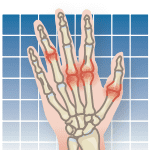A daily glucosamine drink supplement failed to prevent deterioration of knee cartilage, reduce bone bruises or ease knee pain, according to a study published in Arthritis & Rheumatology (April 2014). When studying the effects of glucosamine hydrochloride on a group of 201 adults for six months, researchers found no evidence that drinking the popular dietary product reduced knee cartilage damage, relieved pain or improved function in those with chronic knee pain. The researchers note the study is the first to use magnetic resonance imaging (MRI) to evaluate glucosamines effects on cartilage and bone marrow lesions. The effectiveness of glucosamine in the treatment of osteoarthritis has been the subject of debate for years. Clinical trials show conflicting results, and patients as well as doctors have been left confused by the information available. Most doctors often recommend a three-month trial with pain relief as the endpoint. Some trials suggest the effectiveness of glucosamine may depend on the form used, either glucosamine sulfate versus glucosamine hydrochloride.
To continue reading this article or issue you must be a paid subscriber.
Sign in





























